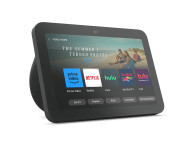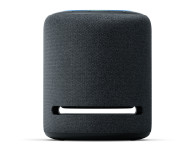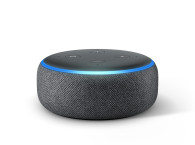
As predicted, voice will be back in full force, now enabled by generative AI engines, and Amazon took the bold decision to be first with its Alexa+ announcement. This is great, because Amazon more than any other company was responsible for making smart speakers a very popular device to enable the connectivity and voice front-end required for these concepts to work. Of course, now Amazon is considering a broader spectrum of Alexa+ enabled platforms in its Echo family, from web-based tools to smart displays, earbuds, and smart glasses. And sure enough, the return of the Amazon Echo smart speaker - with or without alarm-clock display.
Weather users will accept the return of the always-on/always listening devices that compromise privacy, or trust them enough to actually commit a credit card and buy stuff they have no control over, remains to be seen. Alexa+ no longer relies only on database queries that require clumsy and failure-prone speech-to-text, search queries, and text-to-synthesized voice responses. Instead, Alexa+ is now a "next-generation AI assistant that gets things done," which means that your interactions are now interpreted and processed by Claude, a large language model (so named as a reference to mathematician Claude Shannon, and to contrast with the female names of earlier voice assistants such as Alexa, Siri, and Cortana).
Claude is the creation of Anthropic, an American artificial intelligence company founded in 2021 by former members of OpenAI, largely funded by Amazon. The latest, improved version of Claude expands on its multimodal capabilities and was the result of extensive cooperation between Anthropic and Amazon. Amazon's next-generation AI assistant was implemented in less than a year as a result of that collaboration, focusing on natural language interactions and e-commerce integration.
Being powered by generative AI means not only better search results and detailed answers but also extending the integration possibilities, including for Internet navigation. Alexa+ gained "agentic capabilities," which means Alexa is able to navigate the Internet to complete tasks on the user's behalf, behind the scenes. As Amazon promotes, Alexa+ will be able to help users organize their calendar and daily activities, allowing the next-generation assistant to anticipate every opportunity to book and buy stuff for the user. In Amazon's words: "Alexa+ acts on your behalf, handling everything from date planning and gift shopping to travel arrangements and study help. From simple tasks to complex projects, it provides assistance you can trust."
As Amazon also details, Alexa+ is able to "engage in natural, flowing conversations that feel genuine. It understands context and meaning, creating seamless interactions with no need for precise “Alexa” language." This enables a new level of personalization: "Alexa+ learns from you, and the more you use it, the more personalized it gets — understanding everything from your favorite entertainment to your family’s dietary preferences, allergies, and weekly traditions."
But the new AI assistant is just the beginning. Amazon expects Alexa+ to "break the code" to eliminate existing roadblocks in smart home integration. For that purpose, Amazon confirmed integrations with products from Philips Hue, Roborock, and more, enhanced abilities for Ring devices, and direct integrations with streaming music providers including Spotify, Apple Music, and iHeartRadio - not only Amazon Music.

The "integrations" also include booking restaurants with OpenTable, ordering groceries from Amazon Fresh and Whole Foods Market, or deliveries from Grubhub and Uber Eats; buying tickets on Ticketmaster. As usage expands, Amazon expects Alexa+ to be a complete knowledge repository of the user's history and preferences, as well as family members becoming proactive when anticipating our needs. If you decide to surprise your wife on your anniversary, and meet her at work to go and grab a hot dog, you should ask Alexa+ first, because she already booked a table for the two of you at a fancy restaurant that serves your favorite kind of food.
Interestingly, with the Alexa+ announcement, we learn a bit more about how Amazon still sees the scope of previous (mostly failed) efforts. Amazon says that there are over 600 million Alexa devices in the field (they don't say how many remain active and connected). Amazon also wants to expand Alexa+ to the office, and increasingly to the car. For now, users will be able to access Alexa+ in a new mobile app and a new browser-based experience at Alexa.com. Some Echo devices will be updated to support Alexa+.

"We've infused cutting-edge LLMs with Alexa's vast knowledge base, creating a meaningfully smarter AI assistant that never stops learning," Amazon says. "You can also add to her knowledge by sharing documents, emails, photos, and messages — via a desktop browser, the mobile app, or even via email — for Alexa to remember, summarize, or take action on. For example, you could send a picture of a live music schedule, and have Alexa add the details to your calendar; upload study materials and ask Alexa to turn them into a quiz; or forward emails from the kids’ school to Alexa, then say, “Add all early dismissals to my calendar,” or, “Remind me what days I’m volunteering in the classroom.”
Alexa+ costs $19.99 per month, but is free for all Amazon Prime members. Alexa+ will start rolling out in the US in the next few weeks during an early access period, and subsequently in waves over the coming months. Echo Show 8, 10, 15, and 21 device owners will have priority in the early access period. New devices built for Alexa+ will be unveiled in 2025.
www.amazon.com







